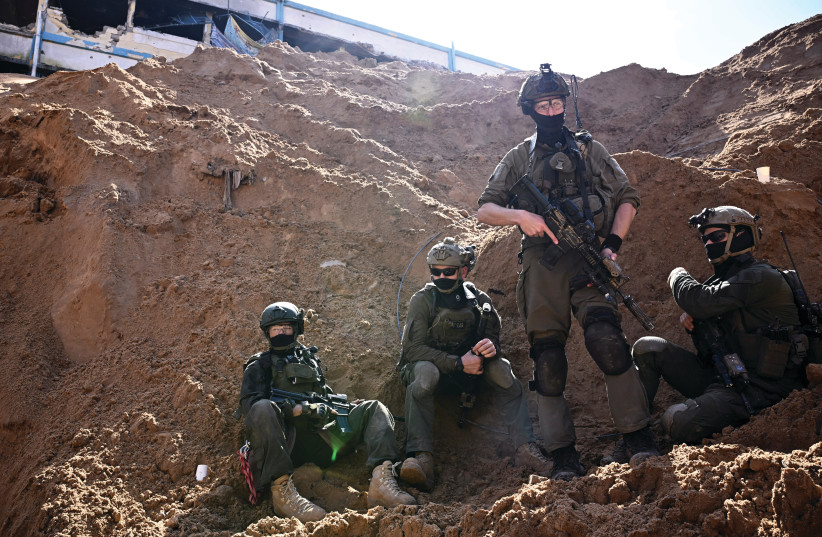After more than two decades of reserve duty, I decided to leave the military two years ago when I turned 50. I figured that I had done my part for the country and that it would be best to focus on my career in academia.
For more stories from The Media Line go to themedialine.org
Then, October 7 happened. I knew I didn’t have the luxury of sitting on the sidelines while my country was at war. That day, I got a call from a friend in the army who said my former unit had a big problem: the Israel Defense Forces were struggling to distribute essential supplies to soldiers in the south due to a disorganized supply chain.
As the former head of the logistics supply unit in the IDF, I had dealt with that very issue, so I was not surprised when I was asked to stay by the phone and be available if needed. Sure enough, my former commanding officer called and asked if I could come in. By 9 p.m., I already arranged for a fleet of 30 trucks to drive to the south and get much-needed goods to our soldiers. My first time coming back home after that day was 10 days later when I returned for a few hours to give my wife a hug.
For the past eight months, this has been my reality. I spent more than 200 days in reserve duty. At the peak of the war, I oversaw some 200 trucks that traveled to Israel’s north or south to get critical supplies to our soldiers. I share this not to brag about my contribution, as there are many other Israelis who have done their part, too. None of us is looking for accolades or a pat on the back.
During my reserve duty, I revamped how the IDF transferred supplies to our soldiers. Before I showed up, the entire operation was in utter chaos. Some soldiers and even officers balked at my methodology, but I was insistent.

Looking back, much of my work was inspired by what I taught my students at Afeka Academic College of Engineering in Tel Aviv, where I’m currently the head of the master’s program in engineering and management. I consistently used my expertise in project management to make sure we provide the best service while using minimal resources. We also improved logistic supply lines using optimization methods that I taught.
I also incorporated what I learned from Afeka President Prof. Ami Moyal, who taught me that managing people is about helping people get the results you want, not disturbing them as they work to attain your goals. Moyal has infused this philosophy into Afeka and its institutional culture. He makes his goals clear, and then he lets all of us manage our departments accordingly, without a heavy hand or interference.
I share this story because the entire time I was in reserves—in a remote base in the north of Israel—I also continued my duties as a professor at Afeka. It wasn’t an easy decision, and it was one I made in consultation with those closest to me. Teaching while serving was exceedingly difficult, not just for me but for my whole family.
Some days, I’d make the nearly three-hour journey (one way) to Afeka, lecture, and then drive back to the base before returning home late at night, exhausted and ready to do the whole thing again the very next morning. Other days, I’d be managing dozens of trucks while also conducting Zoom lectures from my office at the base. Luckily, I was able to do this thanks to Afeka’s unique hybrid teaching model that also allowed for student reservists to attend class remotely.
I chose to both serve and teach because I didn’t want to fail either of the things that matter so much to me: my students or my country. My students, like everyone else in the country, did not ask for this war. Many of them want to continue with their studies and resume their plans to embark on exciting and enriching careers. Doing anything to impede that goal would only hurt them.
Afeka soldiers
More than 40% of Afeka’s students have also been in the reserves. In many ways, we were in the same boat, and we tried to maintain some sort of routine in these highly unusual circumstances. I was certainly not alone in this endeavor, as our faculty and management made it a priority to ensure that students received all forms of assistance they needed to complete their studies successfully alongside their military obligations.
That is why we must get back to routine. Routine shows the world that we’re still here, we’re still living, and we refuse to uphold a mentality of war 24/7. We will not only go back to routine, but we’ll maintain it and relish it. For that reason, I was so gratified to see that over 700 students graduated from Afeka last month despite all the obstacles hurled at them during this very challenging year. Now, as engineers, they are key contributors to the country’s prosperity and security. This is what defines the resilient spirit of Israel.
I live in a small community in the north that is home to 600 families. Each one of us is invested in caring for everyone in the community. It was heartwarming to see so many of them help my wife and family when I couldn’t be there for them during these grueling months.
Right now, I breathe a sigh of relief that I’m back home. My daughter has exclaimed how excited she is to see me during the daytime, and I’m enjoying a summer surrounded by the beauty of Israel’s bucolic north.
I know that any sense of calm will likely be short-lived, though. I know that at some point, I’ll be back reporting for duty. But my message will remain the same: life will, and must, go on.
